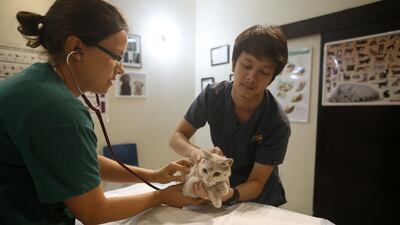ABU DHABI // To help tackle the problem of stray cats in the capital, volunteers are looking to trap, neuter and release 100 cats this Ramadan.
On Thursday, 12 volunteers from Animal Welfare Abu Dhabi (Awad) collected eight cats in the vicinity of the US embassy, and they found 11 cats on Sunday morning around Mina Port.
The Australian Veterinary Hospital is helping by offering reduced rates for the neutering procedure.
Dr Susan Aylott, who is leading the project, hopes to reduce the number of feral cats by thousands.
“There are at least 60 cats in Mina Port that need treating. We can do this efficiently and cheaply,” she said.
“There are vast numbers of cats. Each female can have up to eight kittens, so the exponential growth is huge if the problem is not addressed.”
Street cats are treated, then replaced in the area where they were taken from.
Action was taken this year to curb the population of more than 200 cats on Lulu Island.
Animal welfare workers face a difficult time every summer, and it is not just cats and dogs that need rehoming.
Dr Aylott is also searching for a home for a young baboon after it was abandoned by its owner in Khalifa City.
“It has been a difficult few weeks. The monkey is about six years old and just wasn’t wanted anymore,” she said.
“Its owners sent me photographs, and then asked me to come and collect it.
“It is now in a temporary home and has been there for two weeks. We are desperately trying to find it a new home.”
They hope to place the baboon in a wildlife reserve or zoo.
Last month, Awad volunteers were asked to rescue 15 ostriches who were left without food and water at a farm.
Some of the birds tried to swim towards Yas Island in search of food.
It is all in a day’s work for volunteers like Dr Aylott, who set up a feeding station for the birds with help from The Pet Shack.
“Ostriches can be dangerous if they are left running around,” she said. “They were on a farm on an island but were seen swimming over to Yas beach because they were starving.”
In Dubai, the Middle East Animal Welfare group collected 12 abandoned cats in one week at the end of last month, and volunteers in Al Ain have been facing similar problems.
Briton Lesley Taylor has helped an abandoned dog, called Summer, which was dehydrated, unable to walk and being tormented by children in Al Ain.
The young dog had a broken pelvis and was disorientated after suffering a blow to the head, either from being hit by a car or abuse.
“In Al Ain we have very little support and, of course, we end up paying for everything out of our own pockets, as we cannot legally raise funds at the moment,” said Ms Taylor.
“The good news is that the dog is not in pain and the vet at Britvet in Khalifa City did various tests, determining that there is a neurological problem, possibly caused by a knock on the head.”
Summer’s treatment is likely to cost more than Dh10,000, with bills being paid by volunteers such as British teacher Charlotte Hartill, 33, who will try to find a home for the dog.
“It is difficult to find new homes for dogs, particularly during the summer, as so many animals are abandoned,” she said.
“We don’t have any orthopaedic specialists in Al Ain, or specialists who can deal with the dog’s injuries.
“I’ve helped to rescue and rehome 23 dogs this year, and I’ve got four rescue dogs myself. So I need to find a home for Summer once she has recovered.”
People can sponsor a cat via the Awad Ramadan 100 TNR Campaign. To help, email Dr Aylott at animalwelfareAD@aol.com.
nwebster@thenational.ae


